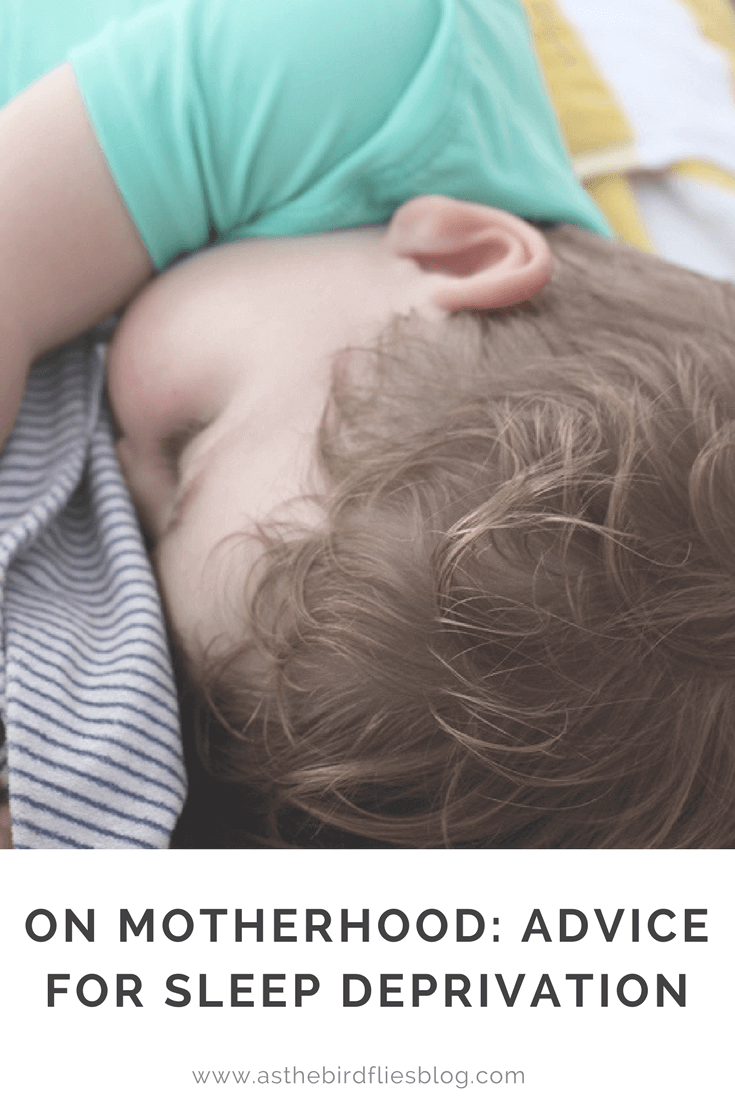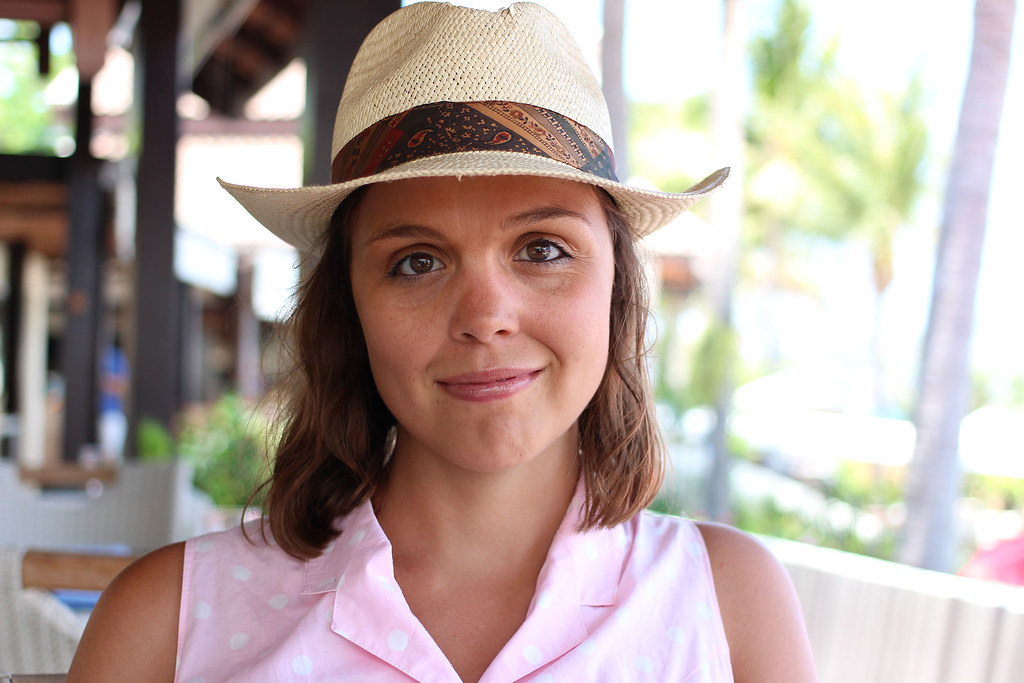On Motherhood: How to Survive Sleep Deprivation as a New Parent

If you've read my motherhood diaries you may be wondering why I'm writing this, because **Spoiler Alert** I didn't really cope with no sleep and I have not doubt that sleep deprivation was a key contributing factor to my post-natal depression and anxiety.
However, hindsight is a wonderful and educational thing and I can now see what did and didn't help survive the sleep deprivation of those frankly torturously hard first months. While I read hundreds of articles about what parents should do with their child who isn't sleeping well, I didn't find any that dealt with what a mother (or parent/carer) can do to cope during those months of constant sleep deprivation. So that's why I'm writing this.
Here's a little introduction to what sleep problems we experienced so you know where we're coming from.
My experience with sleep deprivation as a new mother
Over the course of about fourteen months, I only had a handful of nights where I slept about seven or eight hours in a single block.
It was the week before my son's first birthday when he finally "slept through" the night from around 7.30pm til 6am. (There are various definitions of "sleeping through" though most will say it's a period of about six-eight hours, but for me as a tired, nearly broken mum nothing less than not waking before morning is "sleeping through"!) And it took him another four months to make this a regular occurence, rather than a fluke.
From his birth until around five or six months, my son and I very rarely slept for longer than two hours at a time. Even after my son had become accustomed to day and night (between six to eight weeks) he still would wake frequently and rarely slept more than one sleep cycle for his daytime naps. As with many newborns he never went to sleep after being place in his cot, I would invariably have to hold him or "wear" him in our baby carrier. He would also fall asleep in his pram but would wake as soon as motion stopped. After starting a bedtime routine around ten weeks, he would go to sleep better in his cot, but would invariably wake after his first sleep cycle (around 45-60 minutes after going down).
After about three months when friends babies were sleeping four to five hours at a time and books and medical professionals told us that this "should" be the case, we realised our boy found it harder to "put himself" to sleep and so we began discussing ways to help him and help us. This is not a post about sleep training, but let's just say we tried A LOT of different things (consistently and by the book), and we made very little progress. Instead we adopted a sort of "self-preservation" mode where ensuring each of us got enough sleep to cope the next day was our top priority. So I would go to bed around 8pm or 8.30pm and my partner would stay up and deal with any wake-ups by our son. He would also give him a bottle around 11pm just before he went to bed. All being well I would sleep through until 1 or 2am and then my boy would usually wake and I would feed him. I would then invariably be woken up once or twice to feed him again before he wanted to get up for the day around 6am. At this stage (and certainly once he was eating solids) my son didn't need the milk but he/we had created a sleep assocation with nursing and so it was the easiest and quickest way to get him back to sleep again. Because of my difficulties with anxiety, I found it extremely difficult to go back to sleep after those middle of the night wake-ups so some mornings I would get out of bed at 6 o'clock to "get ready" for the day, having been awake since 1 or 2am. It's fair to say that the word "zombie" could quite accurately describe my appearance and sense of self for much of the first year of my son's life.
We had some moments of relief where our boy would sleep well and only wake very briefly if he slept in the same bed as us, however, as soon as he discovered the use of his arms and legs, that became less restful!
In short, we suffered some extreme sleep deprivation during the first few year (and a half) of our son's life and it took a toll on our mental and physical health, on our relationship, our jobs and our general standard of living. While I have no magic wand to make your child (or you!) go to sleep instantly and sleep for hours on end, I do feel there are things you can do (or not do!) that will help you on those days when it feel unbearable and it feels you're never going to sleep.
Tips for surviving sleep deprivation as a new parent
And now here are the things I want to share that will hopefully help others...
Don't ever think that it's "normal"
Okay, so yes, babies waking their parents up during the night is normal. It's also "normal" when older children do this. It's part and parcel of parenting. But chronic sleep deprivation is not normal, in that it's not healthy and it can alter your mind and body, and make you very unwell. We all need sleep to function (let alone thrive) and the early months of life with a newborn are very physically, mentally and emotionally demanding. Even if you had eight hours of uninterrupted sleep, a full day of looking after a newborn is exhausting and draining, so to do this on repeat with next to no sleep is brutal and can take its toll on even the toughest person's well-being. And that's without us even discussing the long-lasting impact of giving birth (in whatever way!) on a mother.
It's important to remember that for thousands of years, babies were born into villages and were surrounded by many other elders readily available to hold the baby, soothe it to sleep, or keep it occupied while the mother rested. Furthermore, women didn't work 12-hour days and there weren't the same daily demands on parents. People focused on the basics - food, shelter, clothing, water - and once these bases were covered, they didn't have TVs to watch, computers to work on or phones to endlessly scroll on. They rested. Nowadays, in many non-Western cultures it's common for the mother of a newborn baby to stay in bed for 30 days (or longer) so that she can fully recover from childbirth. Western societies look very different from these "it takes a village" models and I strongly believe that this takes a toll on the mother, especially if she too doesn't or can't take care of herself.
For the first year of my son's life I wasn't just mentally unwell but I had cold after cold after cold. I had a throat infection, two quite violent stomach bugs, an inner ear infection and I fell over more than a few times including nearly breaking my ankle and elbow (in separate incidents). Even in the second year of his life, I kept getting unwell and had the worst flu I've ever experienced, lasting nearly two weeks. I have had a number of blood tests and medical examinations because of these repeated cases of illness but the only physical explanation was that I was run down. Yes, of course this is partly because my son was bringing home new bugs from his daycare, but my immune system was very weak because, at least in part, I was utterly exhausted.
Tell a medical professional
As I mentioned above, sleep deprivation is scientifically proven to be a contributing factor for mental health problems and mothers are already susceptible to depression and anxiety, so don't for a single second think that you have to "battle on" if the lack of sleep is constant and begins to make you feel unwell. I'm not saying phone your doctor every time you feel tired (because that would mean a very big phone bill) but rather be mindful of what feels manageable or what feels totally overwhelming. I can remember days where I felt better after a shower and a cup of tea, but other days I would feel physically sick just pulling my body out of bed and that feeling didn't end until I went to bed that night. I also began to fear evenings and the night and experienced a number of mild panic attacks just getting ready for bed. None of this is "normal" or good for you.
I'll acknowledge that not all doctors will be sympathetic to a new mother with XXL bags under her eyes, but don't let one unsympathetic or unhelpful response stop you. See another doctor, tell a nurse or doctor at your child's check-ups or contact your midwife. It's not unusual now (certainly in UK and Netherlands where I've spoken with other mothers) for doctors to refer babies who don't sleep well to sleep consultants or to medical specialists to see if there are medical reasons for poor sleep (and there often is!), and I was personally advised to take anti-anxiety medication because me not sleeping was seen as the main cause of many of my health problems.
Tell people who can help and ask for help
If you find that or don't feel a medical professional is going to help you then please seek out someone who can. That doesn't mean telling someone who can magically make all your sleep problems disappear (because I did that Google search and they don't exist) but rather someone who can come hold the baby while you sleep for a few hours, or someone who can do a grocery shop for you when you're not able to leave the house, or someone who can stay over and help you out overnight if you're a single mother. Don't tell them "I'm tired, I need some help", say "I'm not well, I need some help" because while both are true, the latter is much more effective at a) getting help and b) helping you realise you need to accept it. If you can afford it, get help from a babysitter. You don't even have to leave the house, just know that another person is there if your baby cries. We are lucky that we could afford to pay a friend to babysit for just a few hours once a week when Baby Bird was very young, and we also paid for cleaners so I didn't have to worry about cleaning the house.
Asking for help is the single bravest thing you can do as a new mother. It will save you and your child (and your partner) so much pain and anguish in the long run. I speak from experience because I didn't really ask for help and I know now that this pressure on myself made my recovery from childbirth a long and draining process, and I also know it meant catching up on lost sleep was next to impossible until my son was in daycare (at four months).
Don't live your "normal" life
Sleep deprivation does not lend itself to optimal productivity, or even any kind of productivity. Your energy will be unpredictable (and generally quite low) and while you may want to do work or other non-parenting activities, I would highly recommend prioritising what me-time you get for sleep and rest, or things that make you feel good. Even with the baby, make lying down, relaxing and easy-going activities your priority. Due to my anxiety I found it very hard to sleep when my boy was sleeping (phantom baby cries are a REAL THING!) but I now wonder if I would have found it easier if I'd tried harder (i.e. turned off Netflix or put my phone down). As it happened, once I got in the habit of having an afternoon nap with my son by my side, I did find I could sleep and those short naps were life savers most days.
I also didn't go back to work "properly" until I was sleeping more. Instead I was selective about the work I did and I used some of the time when my son was at daycare (which was two a week until he was about ten months and now he goes three days a week) to catch up on sleep, do loads of washing, do some writing and other things that I enjoyed.
Don't make any big changes or decisions
In line with the point above, try not to make any big plans or decisions while you're lacking in sleep. Not only will you not really have the energy or focus to undertake a house move or a big trip or a stressful work project, but you are simply increasing your need for sleep when you make your life busier. We had hoped to buy our first home during the year following our son's birth but we were just too darn knackered - especially me. Our relationship was also under the usual strains of newborn life and so attempting to make any decisions or go on house viewings would probably have pushed us over the edge, and that's not even mentioning the stress of the requisite IKEA visits...
I'm so glad we were lucky enough to wait until our son was sleeping better so we weren't completely shattered in embarking on something that yes, was indeed stressful, but we ultimately also enjoyed doing all together as a family.
It's not just a phase and your experience is YOUR experience
It's hard to count the number of people who would tell me the sleepless nights were "just a phase" or "I've been there and it will end soon" but it's easy for me to say I wanted to thump each and everyone of them. Of course, it's just a phase in that things are always changing, and yes, all mothers have been there, but it's a phase that lasts a different amount amount of time for every single mother. For some it's a few weeks, for others it's a few years or longer. Furthermore, people need different amounts of sleep and we all react differently to sleep deprivation. The moment I stopped waiting for the "phase" to end, I let go of so much pressure on myself and my son to sleep perfectly by a certain time and I avoided that constant disappointment when yet another month had passed and he still wasn't sleeping through...
There is nothing wrong or bad with you or your baby
It's hard to understand just how... err... useless newborn babies are until you've nurtured one from that first day of life through to toddlerhood. They know nothing. NOTHING. Even feeding isn't as "natural" as some claim it to be. Babies have to learn how to do EVERYTHING and that includes sleeping.
Many will learn how to sleep without any problem at all. For my son, nearly immediately we saw that sleep was very difficult for him and it took him a long time to feel comfortable enough to fall asleep in my or his dad's arms. It also took him even longer to learn to fall asleep without us, and even now at the age of two, if there's something better going on, he will fight sleep and stay awake as long as he possibly can. He has always slept less than the "average" for his age and he has nearly always been an early riser. He's just not a big sleeper.
It's also because of how little babies can do that we don't have much to base opinions on apart from how well they sleep and eat. Despite being a champion eater from the start (who actually gained weight in his first few days of life), I would invariably hear (good-hearted, well-intentioned) people call my son "naughty" or "a terror" because he didn't sleep well. Heck, on bad days, I did it too. But this really didn't make me feel good, and not just in the overly-protective way any mother would feel. It just made me question what I had done wrong to make him not sleep well. I questioned everything from what I ate during pregnancy to whether there was something wrong with my breastmilk. None of this served us. It didn't help him sleep more and it certainly kept my already manic mind too busy when I should have been sleeping.
As soon as I stopped seeing my boy's sleeping patterns in only negative terms I took a lot of pressure off myself and I found myself feeling warmer and closer to him. My boy is not a bad baby or child because he didn't/doesn't sleep as much as other children, and thinking that will only hurt him and me.
Understand sleep cycles
I'm not going to give any "sleep training" tips here because I strongly feel that it's not for any parent to tell another parent what they should do to solve X or Y problem, but for now please know that it took several tries of several different methods before something "stuck" and even that wasn't a foolproof solution. In fact, it was only when I stopped breastfeeding that he slept through the night more often than not (presumably because there was nothing worth waking up for!) but one thing that helped us almost instantly was understanding a baby's sleep and awake cycles as this helped us pre-empt when Baby Bird would need a nap, and we could therefore prepare him and his environment for sleep. I always thought that when babies were very small they would just fall asleep whenever and wherever they were tired. This was hardly ever the case for our son and if he wasn't swaddled, being carried, in his pram or lying down next to us in our bed, he could dodge a nap for ours, even as young as one or two months. As soon as I read articles similar to this one which is backed by scientific research, I knew what to expect from my son in terms of when he would get tired and how this would change
You do you
More on this point, you will find that other people will want to give you advice (or sometimes orders) on what to do ("just ignore it", "let them cry it out", "put whisky/flour/rice powder in their milk", "give them chamomile tea before bed", "I co-sleept with mine until they were five, didn't do them any harm!") but there's something quite jarring about trying someone else's tactic on your beloved firstborn when you're not ready... or when you're already quite emotionally vulnerable because YOU ARE ABSOLUTELY SHATTERED. It will just feel "off" at best, or traumatising at worst. Different people have different reactions to screaming, crying or distressed babies and you need to work within your comfort zone. If you are going to do any sleep training that involves your baby crying (which I am absolutely NOT agains) you need to feel confident and focused on what you're doing, rather than questioning yourself because it's what your Great Aunt Gladys did fifty years ago... for example.
Deal with all barriers to sleep
If, like me, it isn't just your baby waking that keeps you awake at night but worries, or feels or a general sense of unease, please consider telling your doctor or midwife so they can help advise you on how to deal with this discomfort. It may mean medication (like it did for me - which definitely helped improve my sleep) or it may mean you need to try other calming and relaxing practices like having a bath, meditation, acupuncture, massage, yoga.... I would also recommend keeping your phone on airplane mode overnight (or keeping it out of the bedroom completely) and try going to bed before you're dog-tired as you will then feel more relaxed in general and like babies, sometimes we can miss our sleepy point and go from tired to wired!
Find a support "group"
While each person's experience will differ, there is something comforting in knowing our not alone as a sleep-deprived parent. One of the best things I did was join a Facebook group for parents dealing with sleep problems and seeing how hard others were also finding it, and invariably reading about similar experiences, was incredibly reassuring. It also made me feel brave and supported enough to begin sleep training which ultimately vastly improved our lives. There is a book now written by the woman who manages the group I joined and while I haven't read it myself,if it's a condensed summarising of her (and the group's) vast experience managing sleep issues in infants, then it could be a worthy investment.
Sunday lunchtime is the new Friday night
One of the biggest sacrifices for me when my son wasn't sleeping well was my social life. At the time I didn't care because I was too exhausted and fragile to face bars or restaurants but once I did start seeing friends regularly, I realised how much I missed being with good friends and being in adult company. Also, I quite like wine. I also know that for many new mothers, socialising and going out will be a key way they feel enjoy themselves and feel more like their old selves after birth and pregnancy. But late nights and hangovers were next to impossible to handle thanks to my anxiety and the demands of a young baby. Instead, we made more of our weekends and would have more meet-ups on Saturday or Sundays, knowing we could all collapse in a heap and be in bed before 8pm if we needed to.
Don't go back to work until you're ready to go back to work
I'm well aware that not everybody will have this luxury, but those who can afford to take more time before they go back to work, please do. If you're not sleeping enough, working will be very hard, especially if your job is physically or mentally demanding and you work long hours. This will then make it harder to stay healthy. Any doctor - and hopefully employer! - should support you in not going back to work until you are ready.
I'm very, very lucky in that I enjoy my work and I can control how much I do (as a freelancer) so actually going back to work for me was a good thing as I could exercise part of my brain that had been a bit dormant and this made me feel more balanced. However, I couldn't do anything like my pre-baby levels of work and it wasn't until a year after he started daycare that I was using all of his childcare hours just for client work, instead I would invariably use half of that time to catch up on domestic tasks at home or yes, to sleep! While my income suffered and at the time I experienced a lot of guilt I now know how much I needed that time to recover, but also because I don't have family on my doorstep who regularly look after my son so that I can have me-time. Again, you have to do what works for YOU.
Focus on survival
If you do more than a few Google searches about sleep problems you'll hear a lot of talk of bad habits and sleep associations, and yep, they're right, there are many ways you can set yourself up for a fall later on, but really, when you're not getting enough sleep and you feel physically and mentally broken, this is not the time to be strict with yourself about what you should and shouldn't do. Your one priority is getting more sleep, and surviving when you don't. Don't forget this.
There is a lot of talk about when babies should be doing certain things and this invariably bleeds into when mums should be doing things like going back to work, fitting back into pre-pregnancy clothes or "feeling normal" again. Ignore this chatter. Nobody knows how hard it is for you right now. Don't be ashamed or embarrased about that. Let it be, so that you can focus on feeling better.
I look back on my sleep-deprived months and I'm actually amazed I did as much as I did outside of parenting, to the point where I now wish I'd taken on less work, set different goals for my writing, and been a lot kinder to myself when I didn't meet deadlines or do things I wanted to do. It was such a lot of unnecessary pressure on myself. I was very unwell and had little to no time to rest or recuperate. That should have been my focus, so please make it yours.
A few practical tips for getting through sleepless nights
Get a nightlight that has calm, low light.
In those early weeks when you have to feed your baby regularly and keep them awake so they get enough milk (though nappy changes and tickling their feet as they nurse), you will need some kind of light to see what you're doing. At first we were putting the bedside light on but we quickly realised this was too harsh and didn't help anybody get back to sleep. We invested in a Philips Hue light and kept it on a soft red glow that was a lot easier on all our eyes during the night feeds. We then moved it into Baby Bird's room when he was in his own room and we still use it to this day as a night light as he is more comfortable going to sleep with a little light in the room.
Work in shifts
If you have a partner who can accommodate this, divide and conquer the nights. Whether you split the night in two like we did, or you take it in turns, or you do one night on and then one night off, do what you can to share the burden of restless nights.
Have everything you need in your room
If your baby is sleeping in the same room as you, make sure you have everything you need close to hand. The last thing you want to do is rummage around looking for a spare nappy in the dark when there's poo climbing up your little one's back... Babies may need multiple nappy changes during the night so have plenty of nappies, wipes, nappy bags, changes of clothes and if your little one takes one - a MILLION clean dummies!
Prepare for total carnage!
So yeah, newborn babies have this unique ability to send poo climbing up their backs, and of course there's all the fun of projectile vomit. Depending on how germ-phobic you are, you may not want to be doing a change of sheets in the middle of the night, and instead you could just throw a clean towel down on top of the damp patch once the majority of yukky stuff has been cleaned up. I know this is SUPER gross to most people but if you're like me and find it hard to go back to sleep once you've got up out of bed and done a few domestic chores, then you'll thank yourself for having a waterproof mattress protector under your bed sheet, a few spare clean towels and sheets to hand, and a packet of anti-bacterial wipes all on your bedroom floor.
White noise(?)
The question mark is here because our boy never really took to white noise. We had the highly recommended Ewan the Dream Sheep ready for him before he was born, but he honestly never really responded well to white noise and never has. That said, it's my experience that he's in the minority and most babies do sleep better with a certain amount of background noise... and anything is worth trying, right!?
A cuddly toy they sleep with
It took ages and ages, but once our boy grew attached to his cuddly zebra, there has been no going back, and this slightly bedraggled bit of fabric has become one of our greatest weapons in the near constant battle to get him to sleep. A gift from some family friends when he was born, we placed the zebra next to Baby Bird every night and naptime (including at daycare!) from birth and by about six or seven months he would actively seek out his new buddy. I also did that thing of carrying the zebra around in my top when he was younger so maybe it was the smell of me (or my milk!) that sealed the deal, but from about ten or eleven months we found his zebra was very comforting in getting him to sleep and back to sleep from wake-ups.
Herbal help for you...
If you're struggling to sleep when the opportunity is there I highly recommend getting some herbal help! Whether that's Kalms, St Johns Wort or Rescue Remedy these herbal remedies are supposed to calm and ease anxiety. I also took melatonin sleeping tablets like these and/or herbal sleeping tablets like these to help keep me drowsy at night because I really struggled to go back to feeling tired once I'd been woken for a feed or to change a nappy or to just soothe a screaming baby.
If you'd like to save this post on Pinterest, here is an image you can use.


Frances M. Thompson
Find Frankie on Facebook, Twitter, Instagram, Pinterest, and Google+.
 Book Reviews: Mid-Year Book Report 2022
Book Reviews: Mid-Year Book Report 2022 My Thoughts: The Life-Enhancing Joy of Romance Novels
My Thoughts: The Life-Enhancing Joy of Romance Novels My Thoughts: 21 Things That Helped Me in 2021
My Thoughts: 21 Things That Helped Me in 2021 Family Travel: How to Travel with Kids - My Golden Rules
Family Travel: How to Travel with Kids - My Golden Rules Self-Love: Self-Care Activities for Kids
Self-Love: Self-Care Activities for Kids About the Blog & Frankie
About the Blog & Frankie Welcome to My Amsterdam Travel Blog!
Welcome to My Amsterdam Travel Blog! Welcome to My Luxury Family Travel Blog!
Welcome to My Luxury Family Travel Blog! Welcome to My Writing Blog!
Welcome to My Writing Blog! Lover Mother Other: Poems - Out Now!
Lover Mother Other: Poems - Out Now! I Write Stories That Move You
I Write Stories That Move You Order WriteNOW Cards - Affirmation Cards for Writers
Order WriteNOW Cards - Affirmation Cards for Writers Work With Me
Work With Me